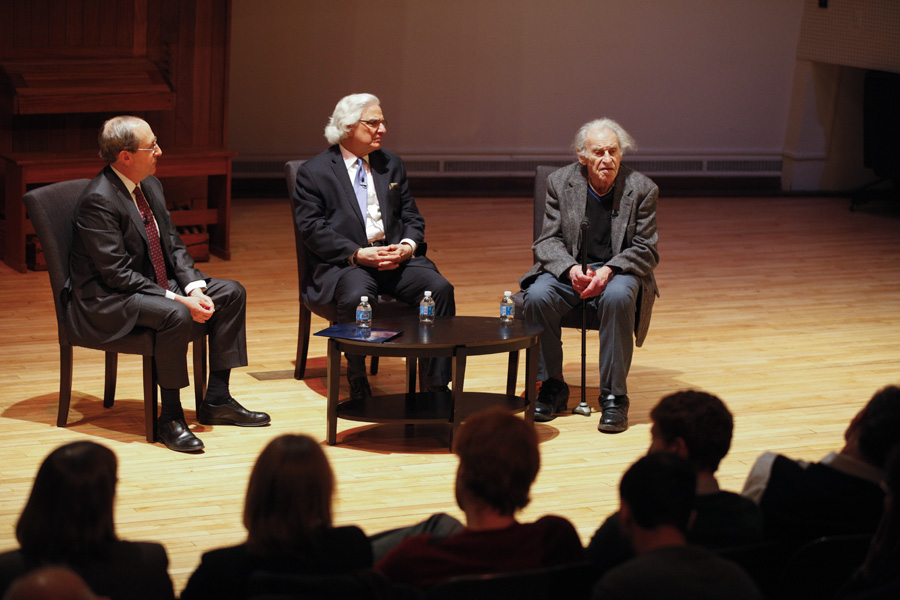Member of Terezín choir visits for 'Defiant Requiem'
Edgar Krasa, a member of Rafael Schächter's choir at Terezín concentration camp, visited Brandeis March 23
 Photo/Mike Lovett
Photo/Mike LovettBrandeis President Frederick M. Lawrence, Murry Sidlin and Edgar Krasa discuss "Defiant Requiem."
Trapped in the Nazi concentration camp Terezín, Czech conductor Rafael Schächter turned to what he knew best to inspire his fellow prisoners and act in defiance of his captors: Music.
Schächter formed a choir, and the first person he enlisted was an 18-year-old who shared his cramped attic dwelling named Edgar Krasa. Now 94 and living in Newton, Massachusetts, Krasa spoke at an event at Brandeis, Monday, March 23 at Slosberg Music Center.
“This music was maintaining our regular life,” Krasa said. “Schächter’s mission was to make every prisoner’s life bearable and he really succeeded.”
The choir practiced in the freezing bowels of Terezín, and their peak act of rebellion was a rendition of Giuseppe Verdi’s “Requiem,” re-imagined as a condemnation of Nazis, performed in front of International Red Cross workers and the Nazi officers who oversaw the concentration camp.
The story of Schächter and his chorus is chronicled in the 2012 documentary “Defiant Requiem.” The film also shows a full orchestra, led by conductor Murry Sidlin, that returned Schächter’s “Defiant Requiem” to Terezín for a performance in front of the camp’s survivors and their families.
Krasa attended the screening of the film at Brandeis on Monday evening, accompanied by his sons, Daniel and Rafael, and two of his grandchildren, Brandeis students Benyamin Louis Meschede and Yonatan Otzar Meschede-Krasa. Members of the Lydian String Quartet performed two-thirds of Verdi’s “Requiem” before the film, and a panel discussion with Brandeis President Frederick M. Lawrence, Sidlin and Krasa followed.
“This is a remarkable redemptive narrative, out of the ashes and out of the darkness,” Lawrence said. “For all of us, this is a story we hear at great personal cost and great personal expense.”
The event was sponsored by the Office of the President and the Department of Music.
Sidlin learned of the little-known choir and the events at Terezín reading a book about music of the Holocaust. As he researched Terezín further, he discovered living members of the choir and eventually founded the Defiant Requiem Foundation, which supports performances of “Defiant Requiem: Verdi at Terezín” around the world, the film, the Rafael Schächter Institute for Arts and Humanities at Terezín, and educational lesson plans for students and teachers.
He said he hopes the film and touring performances of “Requiem” will help inform people and spark interest in the events at Terezín.
“Everywhere we go, I’m astonished how few people have heard of Terezín,” he said. “This is a primer, we hope people are interested in this and they will turn to the scholars.”
Krasa was the first person Sidlin found when he began to research Schächter and his Terezín choir, and Krasa helped him find other living members of the choir.
“The warmth I received from him and his family is where it all began,” Sidlin said. “All we’re doing is telling their (the prisoners of Terezín) story.”
The Defiant Requiem Foundation’s chairman is former U.S. Ambassador to the European Union Stuart Eizenstat, who also spoke Monday. Eizenstat has deep ties to Brandeis: He was a Brandeis trustee 1991-96, his late wife, Frances ’65, is one of several from her family to have graduated from Brandeis, and he established the Frances Taylor Eizenstat ’65 Undergraduate Israel Travel Grant in his wife’s memory in 2013. He said Brandeis was the perfect place to screen the film.
“There is not a more important place for this to be shown than Brandeis University, for what it’s namesake stood for, for what its succession of presidents including Fred Lawrence have stood for, what you’re your faculty has stood for, for the values it embodies,” Eizenstat said.
A live performance of “Defiant Requiem: Verdi at Terezín” will have its New England premiere at Symphony Hall in Boston April 27.
Categories: Arts, Student Life





